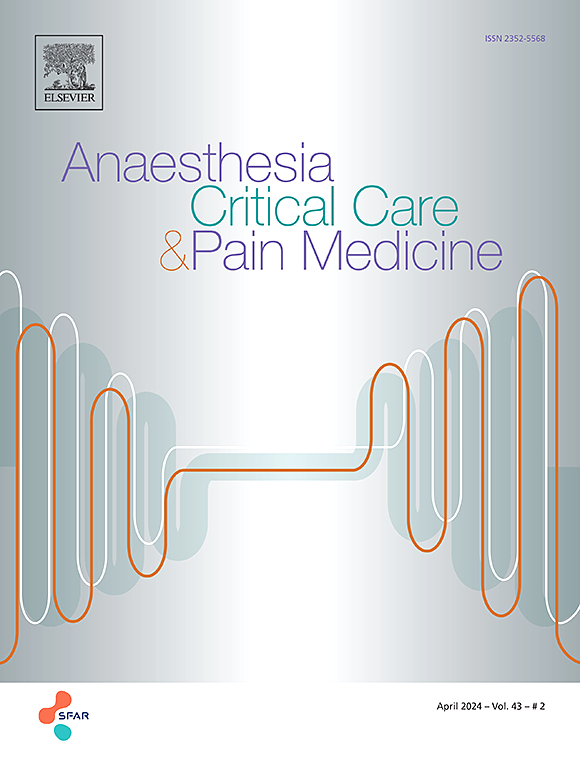The efficacy of magnesium sulphate in preventing laryngospasm in paediatric patients undergoing general anaesthesia: A systematic review and meta-analysis of randomised control trials
IF 3.7
3区 医学
Q1 ANESTHESIOLOGY
引用次数: 0
Abstract
Background
Laryngospasm is sustained closure of the airways and can be a life-threatening condition. Magnesium sulphate is postulated to reduce the incidence of laryngospasm if administered peri-operatively. This systematic review and meta-analysis was performed to assess the efficacy of magnesium sulphate in preventing peri-operative laryngospasm in paediatric patients undergoing non-cardiac surgery.
Methods
Four databases and a trial registry were searched. Inclusion criteria were paediatric patients undergoing general anaesthesia. Exclusion criteria were patients who underwent cardiopulmonary bypass during surgery. The intervention of interest was the peri-operative administration of magnesium sulphate. The intervention was compared to either a placebo or other pharmacological agent.
The primary outcome was the incidence of laryngospasm. A meta-analysis of all studies was performed. Sub-group analysis was subsequently performed.
Results
A total of 953 patients from 13 trials were included in this study. Nine RCTs administered magnesium intravenously and 4 RCTs administered magnesium locally. Laryngospasm rates were 6% lower in the magnesium group (OR 0.48 [95% CI 0.25–0.96], p = 0.04) compared to control in the pooled data. Subgroup analysis showed laryngospasm rates were lower by 12.5% (Odds Ratio 0.26 [CI 0.09–0.76], p = 0.01) in the local magnesium group. Subgroup analysis of studies that only administered intravenous magnesium did not show a statistically significant difference in the incidence of laryngospasm (OR 0.73 [95% CI 0.33–1.63], p = 0.44).
Conclusions
This review shows a potential role for magnesium in the prevention of laryngospasm in paediatric patients undergoing general anaesthesia. There is a correlation between local administration of magnesium and reduction in laryngospasm rates. Further studies are required to assess the efficacy of intravenous magnesium in prevention of laryngospasm.
Registration
Prospective Register of Systematic Reviews (PROSPERO); PROSPERO ID CRD42022307868 (https://www.crd.york.ac.uk/prospero/display_record.php?ID=CRD42022307868).
硫酸镁对接受全身麻醉的儿科患者预防喉痉挛的疗效:随机对照试验的系统回顾和荟萃分析。
背景:喉痉挛是指呼吸道持续关闭,可危及生命。据推测,如果在围手术期使用硫酸镁,可降低喉痉挛的发生率。本系统综述和荟萃分析旨在评估硫酸镁对接受非心脏手术的儿科患者围手术期喉痉挛的预防效果:方法:检索了四个数据库和一个试验登记处。纳入标准为接受全身麻醉的儿科患者。排除标准是在手术过程中接受心肺旁路治疗的患者。所关注的干预措施是围手术期服用硫酸镁。该干预措施与安慰剂或其他药剂进行了比较。主要结果是喉痉挛的发生率。对所有研究进行了荟萃分析。随后进行了分组分析:本研究共纳入了 13 项试验中的 953 名患者。9项研究采用静脉注射镁剂,4项研究采用局部注射镁剂。在汇总数据中,镁剂组的喉痉挛发生率比对照组低 6%(OR 0.48 [95% CI 0.25-0.96],P = 0.04)。亚组分析显示,局部镁组的喉痉挛发生率降低了 12.5%(Odds Ratio 0.26 [CI 0.09-0.76],p = 0.01)。对仅静脉注射镁的研究进行的分组分析表明,喉痉挛发生率的差异无统计学意义(OR 0.73 [95% CI 0.33-1.63],P = 0.44):本综述显示了镁在预防接受全身麻醉的儿科患者喉痉挛方面的潜在作用。局部给药镁与降低喉痉挛发生率之间存在相关性。需要进一步的研究来评估静脉注射镁对预防喉痉挛的疗效:系统综述前瞻性注册(PROSPERO);PROSPERO ID CRD42022307868 (https://www.crd.york.ac.uk/prospero/display_record.php?ID=CRD42022307868)。
本文章由计算机程序翻译,如有差异,请以英文原文为准。
求助全文
约1分钟内获得全文
求助全文
来源期刊

Anaesthesia Critical Care & Pain Medicine
ANESTHESIOLOGY-
CiteScore
6.70
自引率
5.50%
发文量
150
审稿时长
18 days
期刊介绍:
Anaesthesia, Critical Care & Pain Medicine (formerly Annales Françaises d''Anesthésie et de Réanimation) publishes in English the highest quality original material, both scientific and clinical, on all aspects of anaesthesia, critical care & pain medicine.
 求助内容:
求助内容: 应助结果提醒方式:
应助结果提醒方式:


